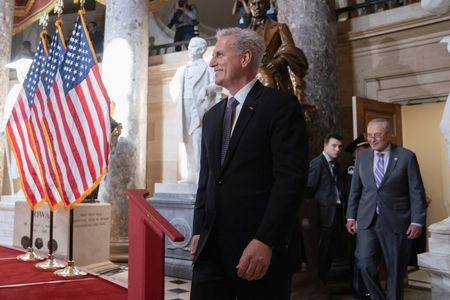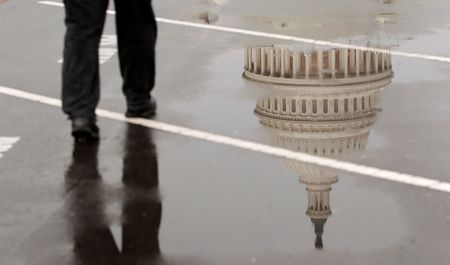 1
1 1
1

By Moira Warburton and Timothy Gardner
WASHINGTON (Reuters) -White House and Republican congressional negotiators on raising the federal $31.4 trillion debt ceiling were not expected to meet on Saturday after talks on Friday failed and as the country inched closer to the debt ceiling deadline on June 1.
U.S. Representative Patrick McHenry, a Republican negotiator, said no meetings were scheduled for Saturday. Republicans leaders were “going to huddle as a team and assess” where things stood,” McHenry said at the U.S. Capitol. He did not comment whether there would be more talks on Sunday.
Two meetings ended on Friday with no progress cited by either side and with negotiators saying they were not sure when fresh meetings would take place. There are less than two weeks before June 1, when the U.S. Treasury Department has warned that the federal government could be unable to pay all its debts. That would trigger a default that could cause chaos in financial markets and spike interest rates.
Biden said in Japan late on Friday Washington time that he still believed a default could be avoided.
“I still believe we’ll be able to avoid a default and we’ll get something decent done,” Biden told reporters in Hiroshima, Japan, where he is attending a meeting of leaders of the Group of Seven rich nations.
Biden was upbeat despite the White House acknowledging that “serious differences” remained with Republicans, who control the House of Representatives.
House of Representatives Speaker Kevin McCarthy has said that progress needed to be made on changing the “trajectory” of U.S. government deficit spending and rapidly rising debt.
Republicans are pushing for sharp spending cuts in exchange for the increase in the government’s self-imposed borrowing limit, a move needed regularly to cover costs of spending and tax cuts previously approved by lawmakers.
Republicans control the House by a thin margin, while Biden’s Democrats have a thin Senate majority, making it difficult to strike a deal that would pass both chambers.
Democrats have been pushing to hold spending steady at this year’s levels, while Republicans want to return to 2022 levels. A plan passed by the House last month would cut a wide swath of government spending by 8% next year.
Democrats say that would force average cuts of at least 22% on programs like education and law enforcement, a figure top Republicans have not disputed.
(Reporting by Timothy Gardner, Moira Warburton and Jason LangeEditing by Nick Zieminski)